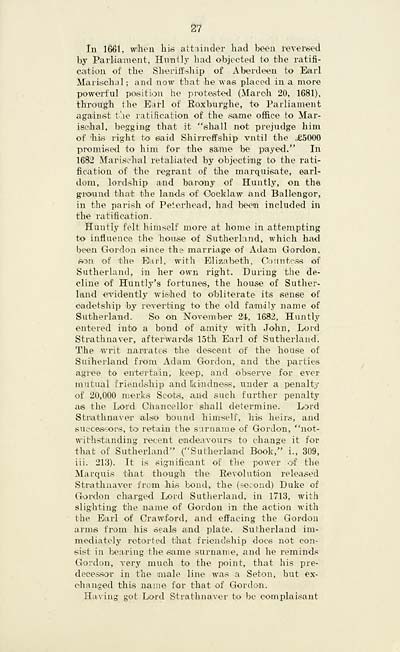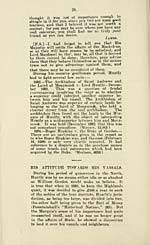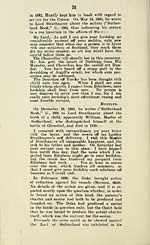1st Duke of Gordon
(31) Page 27
Download files
Complete book:
Individual page:
Thumbnail gallery: Grid view | List view

27
In 1661, when his attainder had been reversed
by Parliament, Hulntly had objected to the ratifi-
cation of the Sheriffship of Aberdeen to Earl
Marischal ; and now that he was placed in a more
powerful position he protested (March 20, 1681),
through the Earl of Roxburghe, to Parliament
against the ratification of the same office to Mar-
ischal, begging that it "shall not prejudge him
of his right to said Shirreffship vntil the ,£5000
promised to him for the same be payed." In
1682 Marischal retaliated by objecting to the rati-
fication of the regrant of the marquisate, earl-
dom, lordship and barony of Huntly, on the
ground that the lands of Cock law and Ballengor,
in the parish of Peterhead, had been included in
the ratification.
Huntly felt himself more at home in attempting
to influence the house of Sutherland, which had
been Gordon since the marriage of Adam Gordon,
son of the Earl, with Elizabeth, Countess of
Sutherland, in her own right. During the de-
cline of Huntly' s fortunes, the house of Suther-
land evidently wished to obliterate its sense of
oadetship by reverting to the old family name of
Sutherland. So on November 24, 1682, Huntly
entered into a bond of amity with John, Lord
Strathnaver, afterwards 15th Earl of Sutherland.
The writ narrates the descent of the house of
Suiherland from Adam Gordon, and the parties
agree to entertain, keep, and observe for ever
mutual friendship and kindness, under a penalty
of 20,000 merks Scots, and such further penalty
as the Lord Chancellor shall determine. Lord
Strathnaver also bound himself, his heirs, and
successors, to retain the surname of Gordon, "not-
withstanding recent endeavours to change it for
that of Sutherland" ("Sutherland Book," i., 309,
iii. 213). It is significant of the power of the
Marquis that though the Revolution released
Strathnaver from his bond, the (second) Duke of
Gordon charged Lord Sutherland, in 1713, with
slighting the name of Gordon in the action with
the Earl of Crawford, and effacing the Gordon
arms from his seals and plate. Suiherland im-
mediately retorted that friendship does not con-
sist in bearing the same surname, and he reminds
Gordon, very much to the point, that his pre-
decessor in the male line was a Seton, but ex-
changed this name for that of Gordon.
Having got Lord Strathnaver to be complaisant
In 1661, when his attainder had been reversed
by Parliament, Hulntly had objected to the ratifi-
cation of the Sheriffship of Aberdeen to Earl
Marischal ; and now that he was placed in a more
powerful position he protested (March 20, 1681),
through the Earl of Roxburghe, to Parliament
against the ratification of the same office to Mar-
ischal, begging that it "shall not prejudge him
of his right to said Shirreffship vntil the ,£5000
promised to him for the same be payed." In
1682 Marischal retaliated by objecting to the rati-
fication of the regrant of the marquisate, earl-
dom, lordship and barony of Huntly, on the
ground that the lands of Cock law and Ballengor,
in the parish of Peterhead, had been included in
the ratification.
Huntly felt himself more at home in attempting
to influence the house of Sutherland, which had
been Gordon since the marriage of Adam Gordon,
son of the Earl, with Elizabeth, Countess of
Sutherland, in her own right. During the de-
cline of Huntly' s fortunes, the house of Suther-
land evidently wished to obliterate its sense of
oadetship by reverting to the old family name of
Sutherland. So on November 24, 1682, Huntly
entered into a bond of amity with John, Lord
Strathnaver, afterwards 15th Earl of Sutherland.
The writ narrates the descent of the house of
Suiherland from Adam Gordon, and the parties
agree to entertain, keep, and observe for ever
mutual friendship and kindness, under a penalty
of 20,000 merks Scots, and such further penalty
as the Lord Chancellor shall determine. Lord
Strathnaver also bound himself, his heirs, and
successors, to retain the surname of Gordon, "not-
withstanding recent endeavours to change it for
that of Sutherland" ("Sutherland Book," i., 309,
iii. 213). It is significant of the power of the
Marquis that though the Revolution released
Strathnaver from his bond, the (second) Duke of
Gordon charged Lord Sutherland, in 1713, with
slighting the name of Gordon in the action with
the Earl of Crawford, and effacing the Gordon
arms from his seals and plate. Suiherland im-
mediately retorted that friendship does not con-
sist in bearing the same surname, and he reminds
Gordon, very much to the point, that his pre-
decessor in the male line was a Seton, but ex-
changed this name for that of Gordon.
Having got Lord Strathnaver to be complaisant
Set display mode to:
![]() Universal Viewer |
Universal Viewer | ![]() Mirador |
Large image | Transcription
Mirador |
Large image | Transcription
Images and transcriptions on this page, including medium image downloads, may be used under the Creative Commons Attribution 4.0 International Licence unless otherwise stated. ![]()
| Histories of Scottish families > 1st Duke of Gordon > (31) Page 27 |
|---|
| Permanent URL | https://digital.nls.uk/91797548 |
|---|
| Description | A selection of almost 400 printed items relating to the history of Scottish families, mostly dating from the 19th and early 20th centuries. Includes memoirs, genealogies and clan histories, with a few produced by emigrant families. The earliest family history goes back to AD 916. |
|---|

